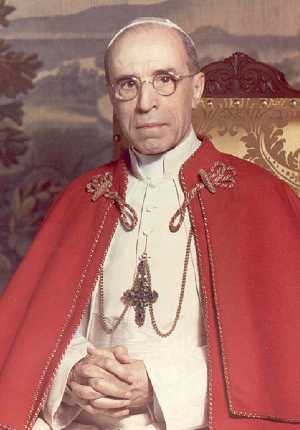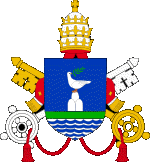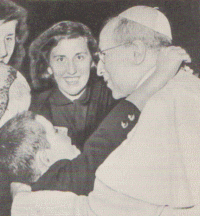 SKC Films Library SKC Films Library |
| SKC Films Library > Religion and Mythology > Christian Denominations > Catholic Church > History |
| Pius XII Pope, 1939-1958 Eugenio Maria Giuseppe Pacelli was born in Rome on March 2, 1876, into a family with legal traditions and long associations with the papal service. He studied at the Visconti Institute, the Almo Capranica Seminary, the Pontifical Gregorian University, the Apollinare Institute of Lateran University, and the University of Rome La Sapienza. He received degrees in theology and civil and canon law in 1899. Ordained a priest on April 2, 1899, his first assignment was as a curate at Chiesa Nuova.
Priesthood In 1901, Father Pacelli was attached to the Sacred Congregation for Extraordinary Affairs, a sub-office of the Secretariat of State. He became a papal chamberlain in 1904, a domestic prelate in 1905, Under-Secretary of the Department of Extraordinary Ecclesiastical Affairs in 1911, Adjunct-Secretary of that department in 1912, and Secretary in 1914. From 1904 to 1916 he assisted Cardinal Gasparri in his codification of canon law. On April 23, 1917, Pope Benedict XV named him Archbishop of Sardes and Apostolic Nuncio to Bavaria. Upon establishment of the Weimar Republic, he was appointed the first Papal Nuncio to Berlin. Father Pacelli's diplomatic experience began when he was chosen by Pope Leo XIII to deliver the Vatican's condolences to King Edward VII following the death of Queen Victoria. In 1908 he met with Winston Churchill as the Vatican representative to International Eucharistic Congress, and he represented the Holy See at the coronation of King George V in 1911. He concluded a concordat with Serbia just four days before the assassination of Archduke Franz Ferdinand. During World War I he maintained the Vatican's registry of prisoners of war, and in 1915 assisted Monsignor Scapinelli in negotiations with Franz Joseph I of Austria regarding Italy. After the war he concluded concordats with Latvia (1922), Bavaria (1925), Poland (1925), Romania (1927), and the Free State of Prussia (1929), and negotiated the Latern treaties with Italy (1929). Papal Secretary of State Pacelli was elevated to Cardinal by Pope Pius XI on December 16, 1929, with the title of SS. Giovanni e Paolo. On February 7, 1930, he was appointed Papal Secretary of State. While serving in this position he signed concordats with Baden (1932), Austria (1933), Germany (1933), Yugoslavia (1935) and Portugal (1940). Of these, the Reichskonkordat with Germany was probably the most important, given that the Vatican subsequently issued 55 protests of violations between 1933 and 1939, with many of them concerning Nazi treatment of those races it deemed inferior. In 1936, Cardinal Pacelli traveled to the United States to meet with President Franklin D. Roosevelt, who subsequently appointed a personal envoy to the Holy See -- the first diplomatic representation from the United States since the Pope lost temporal power in 1870. Pope Pius XII On March 2, 1939, Pacelli was elected to succeed Pope Pius XI, who had died on February 10. He was formally installed as Pope Pius XII on March 12, becoming the first Cardinal Secretary of State to become Pope since Clement IX in 1667. Pope Pius XII's coat of arms featured a dove, a
symbol of peace World War II Given his considerable diplomatic experience, it was only natural for Pius XII to negotiate with the heads of several European governments in an attempt to prevent war, and then to try and end it as soon as possible after it began. Although he declared the Vatican's neutrality after war broke out, Pius XII did not simply sit back and let events unfold. Following the partioning of Poland between Germany and Russia, he wrote an open letter in which he spoke warmly of the Poles and condemned the notion of partioning them between two totalitarian states. In his Christmas message of 1939, Pius XII outlined a five-point program for peace which emphasized the rights of small nations, the protection of minorities, economic co-operation, disarmament, and the influence of religion as the only true guarantee of a "just and lasting" peace. When the Low Countries were attacked by Germany in 1940, he sent messages of comfort to the sovereigns of Belgium, the Netherlands and Luxembourg. As sovereign of a neutral state, the Pope was able to carry on relief work on an extensive scale, especially in regards to mssing soldiers and care of prisoners. During the Nazi reign of terror in Rome following the overthrow of Mussolini, the Vatican was able to shelter a substantial number of escaped prisoners of war, Jews, and leaders of democratic parties. Throughout the war the Vatican was able to save tens of thousands (some say hundreds of thousands) of Jews from Nazi death camps through secret arrangements. Toward the war's end, Pius XII advocated a policy of leniency by the Allies in order to avoid the mistakes made at the end of the First World War. Critic of Communism Pope Pius XII was an outspoken critic of Communism throughout his tenure. In July 1949, he formally excommunicated all members of the Communist party and anyone who aided or abetted it. He furthermore declared that it was not permissable for any Catholic to publish, distribute or read books, periodicals, paper or pamphlets preaching the doctrine of Communism, or to write in them, and that those who did so faced excommunication. In 1951 he addressed a letter to the archibishops, bishops, clergymen and laity of Czechoslovakia denouncing the Communist regime for its religious persecution and accused the government of carrying on a campaign based on falsehoods. On July 7, 1952, he addressed an apostolic letter to the people of Russia reviewing the history of the church in Russia over the previous 1,000 years and recalling instances when the Church had extended spiritual and material aid to Russians in times of famine. Major Encyclicals Divino Afflante Spiritu (1943), issued in response to improvements in Biblical archaeology, encouraged Christian theologians to revisit original versions of the Bible in Greek and Hebrew. Mediator Dei (1947) altered several customs, including the shortening of Holy Week ceremonies and relaxing of the law of fasting before Holy Communion. Summi Maeroris (1950) deplored the evils of the new "murderous and inhuman weapons" of war and reiterated his severe strictures on the Soviet system. Humani Generis (1950) condemned certain "false opinions" which threatened the foundations of the Catholic faith (that is, that evolution fully explained the origins and growth of humans). But it also explained how the "Big Bang Theory" easily fit the Bible's description of how the universe came into being in an instant, and how evolution could conceivably be a part of God's overall plan. Evangelii Praecones (1951) praised Catholic missionary progress of the preceding 25 years. Sempiternus Rex (1951) commemorated the 15th centenary of the council of Chalcedon. Ingruentium Malorum (1951) urged all Catholics to recite the rosary as a means of imploring divine intervention for peace. Rerum novarum (1953) reasserted the interest of the church in social welfare. Fulgens Corona (1954) proclaimed the year as a Marian year. Pope Pius XII addressing the Young
Catholic Workers Congress at the Vatican in August 1957 Thomas Devlin of Stoneham,
Massachusetts, embraces Pope Pius XII, in 1957 Proclaimed the Assumption of the Blessed Virgin into heaven on November 1, 1950. On October 3, 1953, at the 6th International Congress on Penal Law, he urged adoption by all civilized nations of a code of international criminal law to punish war criminals, including those responsible for starting unjust wars and mass deportations of civilian populations. Excommunicated Juan Perón for his arrests of church officials, 1955. Signed concordats with Spain (1953) and the Dominican Republic (1954). Named Saint Casimir the patron saint of all youth. Canonized 34 saints, including: Margaret of Hungary, Gemma Galgani, Mother Cabrini, Catherine Labouré, John de Britto, Joseph Cafasso, Louis de Montfort, Nicholas of Flue, Joan of France, Duchess of Berry, Vincent Strambi, Maria Goretti, Dominic Savio, Pope Pius X, Peter Chanel, Mary Euphrasia Pelletier, Michael Garicoits, Jeanne de Lestonnac, Anthony Mary Claret, Bartolomea Capitanio, Vincenza Gerosa, Ignatius of Laconi. Beatified 6, including: Justin de Jacobius and Rose Venerini Throughout his tenure, Pope Pius XII only held two consistories to create new cardinals. The first, held on on February 18, 1946, elevated a record 32 new cardinals (surpassed by John Paul II in 2001, with 34), and put an end to 500+ years of Italians being a majority in the College of Cardinals The second consistory was held in 1953. Death and Veneration Pope Pius XII died on October 9, 1958, in Castel Gandolfo, the papal summer residence. He was succeeded by John XXIII. The canonization process progressed to the venerable stage on September 2, 2000, under Pope John Paul II. The Boy Scouts of America's highest Catholic emblem is named for him.
SOURCE SEE ALSO |
| SKC Films Library > Religion
and Mythology > Christian
Denominations > Catholic Church > History This page was last updated on June 21, 2017. |


